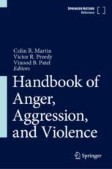Search
Search Results
-
In vivo versus imaginal: Comparing therapists’ willingness to engage in both forms of exposure therapy for repugnant obsessions
Repugnant obsessions are a common theme of intrusions in obsessive-compulsive disorder and are typically ego-dystonic. Exposure and response...
-
Thematic Content Analysis of Repugnant Intrusions in Highly Religious Canadian and Turkish Samples
The degree of religiosity, a culturally relevant concept, has been associated with obsessive phenomena such as obsessional symptoms, the nature of...
-
Thinking About Disgust: Cognitive Processes Mediate the Associations Between Disgust Proneness and OCD Symptom Domains
The present study explored selected cognitive domains in the relationship between disgust proneness and OCD symptomatology, investigating the...

-
Increased attention allocation to stimuli reflecting end-states of compulsive behaviors among obsessive compulsive individuals
Attentional research in OCD has focused solely on threat stimuli, assumed to provoke related obsessions and ensuing compulsions. OCD-related stimuli...

-
Diagnostic Differential Between Pedophilic-OCD and Pedophilic Disorder: An Illustration with Two Vignettes
Despite the prevalence of atypical sexual thoughts in OCD presentations, research suggests that treatment providers often misclassify OCD with...
-
The Relationship Between Obsessive-Compulsive Disorder and Aggression
The relationship between anger and Obsessive-Compulsive Disorder is complex. In literature, there are several studies trying to define this...
-
The Relationship Between Obsessive-Compulsive Disorder and Aggression
The relationship between anger and Obsessive-Compulsive Disorder is complex. In literature, there are several studies trying to define this...
-
Yet You May See the Meaning of Within: The Role of Identity Concerns and the Self in Psychopathology
Concerns and processes regarding one’s identity and “self” are arguably a central component of existential concerns within humankind. This chapter...
-
The links between disgust, feared selves and contamination fear: a mediation path-analytic model
A large body of work has highlighted the role of disgust in contamination-related OCD. However, there appears to be a lack of research examining the...

-
An Experimental Investigation of Moral Self-Violation and Mental Contamination
PurposeCognitive models of mental contamination (feelings of dirtiness/washing behaviour that arise without direct contact with a contaminant)...

-
The Experience of Being Emotionally Maltreated and Self-regulatory Strategies in Obsessive-compulsive Disorder: Pathways to Depressive Symptoms
The contribution of childhood emotional maltreatment to depressive symptoms has been well-established in previous research. However, there is a lack...

-
COVID-19 related stress and fears of contamination: the impact of feared self-perceptions
Specific concerns have been raised for those suffering from obsessive-compulsive disorder (OCD) during the COVID-19 pandemic, particularly those...

-
Obsessive–compulsive symptoms are negatively correlated with motor severity in patients with generalized dystonia
We aimed to clarify the correlations between motor symptoms and obsessive–compulsive symptoms and between the volumes of basal ganglia components and...

-
Intrusive thoughts in patients with obsessive–compulsive and major depressive disorders and non-clinical participants: A comparison using the International Intrusive Thoughts Interview Schedule
Unwanted intrusive thoughts (UITs) have been studied in obsessive–compulsive disorder (OCD) but, despite the relationship between OCD and depression,...

-
Dispositional and Experimentally Induced Mindfulness Are Distinctly Associated with Obsessive Compulsive Symptoms
ObjectivesDespite growing research on mindfulness-based interventions for obsessive compulsive disorder (OCD), it remains unknown which aspects of...

-
Unwanted, Intrusive Thoughts of Infant-Related Harm
Unwanted, intrusive thoughts (UITs) of infant-related harm are a common and normative postpartum experience, particularly among first-time parents....
-
‘Terminal anorexia’: a lived experience perspective on the proposed criteria
In an article (Asaria in J Eat Disord 11:107, 2023) recently published by the Journal of Eating Disorders, I expressed my lived experience views on...
-
Recognizing obsessive-compulsive disorder: how suitable is the German Zohar-Fineberg obsessive-compulsive screen?
BackgroundDespite the prevalence of obsessive-compulsive disorder (OCD), its precise identification remains challenging. With the Zohar-Fineberg...
-
Choice Blindness, Confabulatory Introspection, and Obsessive–Compulsive Symptoms: Investigation in a Clinical Sample
The content of obsessions in obsessive–compulsive disorder (OCD) often run contrary to the actual self of the individual experiencing them. The...

-
Preying on the Other: Culture Wars Narratives in Horror Hunting Films
The culture wars that had ebbed and flowed in contemporary discourse in the United States since the end of the Cold War escalated sharply with the...
